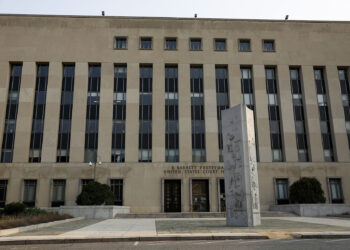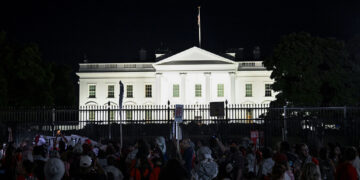John Hursh is the Program Director of DAWN and a Visiting Scholar at the Center for Human Rights and Humanitarian Studies at Brown University.
Published in Responsible Statecraft, September 22, 2021
U.S. foreign policy in the Middle East has proved to be business as usual for the Biden administration, though superficially presented as a break from the Trump administration's embrace of the region's authoritarian leaders. Biden has also stressed democracy and the rule of law as the linchpin of the United States' contest with China, Russia, and the global rise of authoritarianism. Indeed, in his speech to the United Nations General Assembly on Tuesday, Biden vowed to lead the world on advancing human rights and scorned "authoritarians of the world [who] may seek to proclaim the end of the age of democracy."
But the administration remains entranced by the siren calls of defense industry profits, under cover of outdated claims of security imperatives to justify continuing billions in weapons and political support to repressive governments in the Middle East. The human costs of Biden's support for these undemocratic, tyrannical states to the region's people are already clear; the costs of this support for Biden's flagging global "democracy" strategy are yet to be factored in.
Last week was an especially reassuring one for the autocratic and apartheid governments in the region, as the administration exercised a variety of legislative and semantic contortions to keep the military support flowing despite Biden's promises to the American people that these cozy relationships were coming to an end. After leaked claims of intense internal debate to signal genuine angst, the State Department announced that it would waive the block on $170 million of the $300 million of military assistance that Congress had conditioned on Egypt improving its woeful human rights record. Neither Congress nor the White House even debated the merits of the remaining $1 billion in unconditional military aid, keeping with decades of U.S. military support providing billions to successive dictatorships there.
In a farcical bid to maintain a sliver of its purported commitment to human rights, the State Department maintained a $130 million block — less than 10 percent of the aid — but with new "light" conditions tied to Egypt ending its prosecution of a single, decades long case against NGOs for receiving foreign funding. This is the same condition the Trump administration briefly imposed on part of Egypt's aid, despite its low rank on the long list of the country's severe abuses, including the political detention of over 60,000 Egyptians, extrajudicial executions, and systematic torture.
The administration remains entranced by the siren calls of defense industry profits, under cover of outdated claims of security imperatives to justify continuing billions in weapons and political support to repressive governments in the Middle East.
- John Hursh and Sarah Leah Whitson
The waiver followed months of orchestrated political theater starring Egypt as an "essential security partner" on the path to reform, with Secretary of State Antony Blinken traveling to Cairo in late May to thank President Sisi for his role in securing a Hamas ceasefire with Israel. On cue, only three days before the State Department's waiver, the Egyptian government launched a dystopian "National Human Rights Strategy" centered on expanding surveillance and censorship and building new prisons, but presented as evidence of reform.
Two days later, the State Department also gave Saudi Crown Prince Mohamed bin Salman another pat on the back, announcing a possible $500 million in "defensive" military equipment sales to Saudi Arabia, chiefly for purchasing and maintaining helicopters. Though candidate Biden promised to end all military sales to Saudi Arabia, President Biden qualified that this ban would apply only to "offensive" weapons that Saudi Arabia could use in its war in Yemen, while refusing to explain what this distinction means or what weapons it excludes. This follows Biden's approval of a staggering $23 billion weapons sale to the United Arab Emirates, Saudi Arabia's chief partner in the war, in April.
Israel continues to be the biggest winner, and sources reported that the Biden administration, backed by some of the usual suspects in Congress, is trying to sneak an additional $1 billion in military assistance to the country in the upcoming continuing resolution. This push remains entirely in the shadows without a single written request or notification sent to Congress to date.
This too follows a rash of Biden gifts to Israel — not just the four blocked ceasefire resolutions at the U.N. Security Council during Israel's latest bombardment of Palestinian territory — but a $735 million arms sale in May approved by subterfuge to block Senate debate on the first ever resolution of disapproval tabled by Senator Bernie Sanders, refusing to revoke Trump's recognition of Israel's unlawful annexation of the Golan Heights, and continuing to attack and undermine the International Criminal Court for its investigation of the Situation in Palestine, including possible Israeli war crimes. These too come packaged in human rights gestures, like promising to reopen the Palestinian Authority consulate in Jerusalem or vaguely worded assurances about "equal measures of rights and freedoms" for Palestinians in some strange version of verbal wokeness that more recently was downgraded to "equal measures of security, freedom, opportunity and dignity."
If U.S. democracy must rely on a foreign policy that actively supports apartheid, war crimes, and atrocities, then what exactly is the advantage that the United States is offering?
- John Hursh and Sarah Leah Whitson
The administration's justifications for continuing to support these despotic governments relies on decades-old and largely unquestioned claims about the United States' security interests in each country, though it is hard to believe that even anyone at the State Department believes them. Aid to Egypt is necessary to maintain its support for the 1979 Egypt-Israel Peace Treaty? Arming Mohammed bin Salam — and thus enabling his catastrophic, ongoing war in Yemen — is vital to regional security? Nuclear superpower Israel has a defense budget of just under $18 billion for 2022 and has neutralized or obliterated every strong state in the region, but needs U.S. military aid for its security?
The overarching goal these claimed security interests serve, of course, has been maintaining U.S. primacy in the Middle East, whatever its costs and failures. Growing public opposition to the endless wars this has led to did finally result in Biden's withdrawal from Afghanistan, with a promised withdrawal from Iraq to follow. It is rather miraculous that the will of the people triumphed over the ceaseless lobbying of the defense industry and its government enablers to achieve even this result.
Americans are also connecting the dots that U.S. military and political support to abusive governments in the region is part of the same failed approach of interventionism that led to wars in Afghanistan, Iraq, Libya, and Yemen; that's why Biden's campaign pledges, albeit broken, included ending support for Saudi Arabia and Egypt.
Biden stands to pay a much bigger price for these broken pledges by subverting what he has stated as his overarching foreign policy priority: challenging authoritarianism, particularly China's, by championing democracy. Biden described this struggle as the battle that will define the 21st century. But a democracy built on lies and exceptions, like the lies and exceptions that perpetuate the administration's support for tyrannies in the Middle East, will cost the United States this battle because no one will buy it. China and Russia have been quick to illustrate this gap between words and actions, and the harms that U.S. policies have on the people of the Middle East is obvious.
More fundamentally, they raise a more troubling question: if U.S. democracy must rely on a foreign policy that actively supports apartheid, war crimes, and atrocities, then what exactly is the advantage that the United States is offering?





































